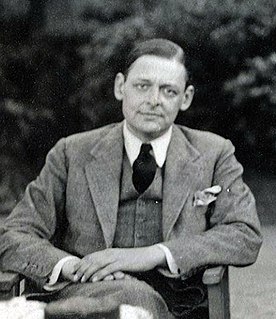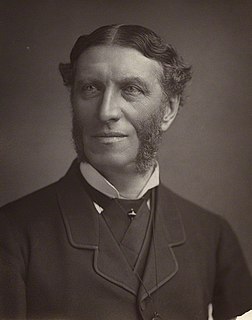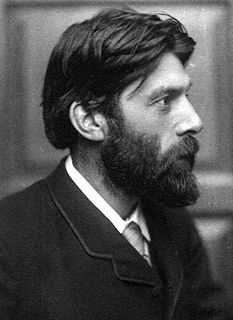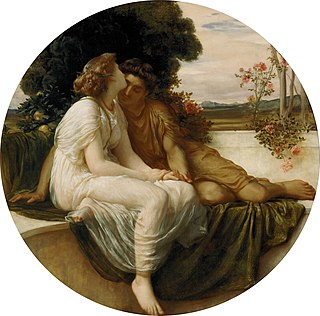Notes
- ↑ Cox, Michael, editor, The Concise Oxford Chronology of English Literature, Oxford University Press, 2004, ISBN 0-19-860634-6
Poems by Melanter is an 1853 collection of poems by English novelist R.D. Blackmore . [1]

Alfred Edward Housman was an English classical scholar and poet. After an initially poor performance while at university, he took employment as a clerk in London and established his academic reputation by publishing as a private scholar at first. Later Housman was appointed Professor of Latin at University College London and then at the University of Cambridge. He is now acknowledged as one of the foremost classicists of his age and has been ranked as one of the greatest scholars at any time. His editions of Juvenal, Manilius and Lucan are still considered authoritative.

Homer was an ancient Greek author and epic poet. He is the reputed author of the Iliad and the Odyssey, the two epic poems that are the foundational works of ancient Greek literature. He is regarded as one of the greatest and most influential authors of all time: for example, in Dante Alighieri's Divine Comedy, Virgil refers to him as "Poet sovereign", king of all poets; in the preface to his translation of the Iliad, Alexander Pope acknowledges that Homer has always been considered the "greatest of poets".

"Jabberwocky" is a nonsense poem written by Lewis Carroll about the killing of a creature named "the Jabberwock". It was included in his 1871 novel Through the Looking-Glass, the sequel to Alice's Adventures in Wonderland (1865). The book tells of Alice's adventures within the back-to-front world of Looking-Glass Land.
Old English literature refers to poetry and prose written in Old English in early medieval England, from the 7th century to the decades after the Norman Conquest of 1066, a period often termed Anglo-Saxon England. The 7th century work Cædmon's Hymn is often considered as the oldest surviving poem in English, as it appears in an 8th-century copy of Bede's text, the Ecclesiastical History of the English People. Poetry written in the mid 12th century represents some of the latest post-Norman examples of Old English. Adherence to the grammatical rules of Old English is largely inconsistent in 12th-century work, and by the 13th century the grammar and syntax of Old English had almost completely deteriorated, giving way to the much larger Middle English corpus of literature.

Poetry is a form of literature that uses aesthetic and often rhythmic qualities of language − such as phonaesthetics, sound symbolism, and metre − to evoke meanings in addition to, or in place of, a prosaic ostensible meaning. A poem is a literary composition, written by a poet, using this principle.

Thomas Stearns Eliot was a poet, essayist, publisher, playwright, literary critic and editor. Considered one of the 20th century's major poets, he is a central figure in English-language Modernist poetry.

Wystan Hugh Auden was a British-American poet. Auden's poetry was noted for its stylistic and technical achievement, its engagement with politics, morals, love, and religion, and its variety in tone, form, and content. Some of his best known poems are about love, such as "Funeral Blues"; on political and social themes, such as "September 1, 1939" and "The Shield of Achilles"; on cultural and psychological themes, such as The Age of Anxiety; and on religious themes such as "For the Time Being" and "Horae Canonicae".

William Wordsworth was an English Romantic poet who, with Samuel Taylor Coleridge, helped to launch the Romantic Age in English literature with their joint publication Lyrical Ballads (1798).

The Poetic Edda is the modern name for an untitled collection of Old Norse anonymous narrative poems, which is distinct from the Prose Edda written by Snorri Sturluson. Several versions exist, all primarily of text from the Icelandic medieval manuscript known as the Codex Regius, which contains 31 poems. The Codex Regius is arguably the most important extant source on Norse mythology and Germanic heroic legends. From the early-19th century onwards, it has had a powerful influence on later Scandinavian literatures – not only through its stories, but also through the visionary force and the dramatic quality of many of the poems. It has also become an inspiring model for many later innovations in poetic meter, particularly in Nordic languages, offering many varied examples of terse, stress-based metrical schemes that lack any final rhyme but instead use alliterative devices and strongly-concentrated imagery. Poets who have acknowledged their debt to the Codex Regius include Vilhelm Ekelund, August Strindberg, J. R. R. Tolkien, Ezra Pound, Jorge Luis Borges, and Karin Boye.

Cædmon is the earliest English poet whose name is known. A Northumbrian who cared for the animals at the double monastery of Streonæshalch during the abbacy of St. Hilda, he was originally ignorant of "the art of song" but learned to compose one night in the course of a dream, according to the 8th-century historian Bede. He later became a zealous monk and an accomplished and inspirational Christian poet.

Matthew Arnold was an English poet and cultural critic who worked as an inspector of schools. He was the son of Thomas Arnold, the celebrated headmaster of Rugby School, and brother to both Tom Arnold, literary professor, and William Delafield Arnold, novelist and colonial administrator. Matthew Arnold has been characterised as a sage writer, a type of writer who chastises and instructs the reader on contemporary social issues. He was also an inspector of schools for thirty-five years, and supported the concept of state-regulated secondary education.

Robert Seymour Bridges was an English poet who was Poet Laureate from 1913 to 1930. A doctor by training, he achieved literary fame only late in life. His poems reflect a deep Christian faith, and he is the author of many well-known hymns. It was through Bridges's efforts that Gerard Manley Hopkins achieved posthumous fame.
In English literature, an elegy is a poem of serious reflection, usually a lament for the dead. However, according to The Oxford Handbook of the Elegy, "for all of its pervasiveness ... the 'elegy' remains remarkably ill defined: sometimes used as a catch-all to denominate texts of a somber or pessimistic tone, sometimes as a marker for textual monumentalizing, and sometimes strictly as a sign of a lament for the dead".
In book publishing, an anthology is a collection of literary works chosen by the compiler; it may be a collection of plays, poems, short stories, songs or excerpts by different authors.

Nissim Ezekiel was an Indian Jewish poet, actor, playwright, editor and art critic. He was a foundational figure in postcolonial India's literary history, specifically for Indian Poetry in English.

The canto is a principal form of division in medieval and modern long poetry.

The poetry of Gaius Valerius Catullus was written towards the end of the Roman Republic. It describes the lifestyle of the poet and his friends, as well as, most famously, his love for the woman he calls Lesbia.
The Oxford Magazine is a review magazine and newspaper published in Oxford, England.
Keki N. Daruwalla is an Indian poet and short story writer in English. He is also a former Indian Police Service officer. He was awarded the Sahitya Akademi Award, in 1984 for his poetry collection, The Keeper of the Dead, by the Sahitya Akademi, India's National Academy of Letters. He was awarded Padma Shri, the fourth highest civilian award in India, in 2014.

"The Beginnings" is a 1917 poem by the English writer Rudyard Kipling. The poem is about how the English people, although naturally peaceful, slowly become filled with a hate which will lead to the advent of a new epoch.